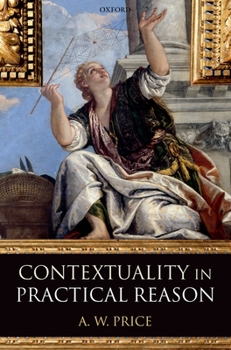Contextuality in Practical Reason
A. W. Price explores the varying ways in which context is relevant to our reasoning about what to do. He investigates the role of context in our interpretation and assessment of practical inferences (especially from one intention to another), practical judgements (especially involving the term "ought"), inferences from conditional "ought"-judgements, and the ascription to agents of reasons for action. Practical inferences are subject not to a special logic, but to a teleology that they share with action itself. Their inherent purpose is to forward an end of action, and not to be logically valid. Practical judgments are commonly to be understood relatively to an implicit context of goals and circumstances. Apparently conflicting or imprudent "oughts" can show up as true once they are interpreted contextually, with an eye to different ends, and different aspects of a situation. This makes acceptable certain patterns of inference that would otherwise license counter-intuitive conclusions. What reasons for action are ascribable to an agent depends both on the context of action, and on the deliberative context. Facts tell in favor of actions against a background of particular circumstances, and in ways whose relevance to an ascription to an agent of a reason for action depends upon the perspective within which the ascription is made.
Format:Hardcover
Language:English
ISBN:0199534799
ISBN13:9780199534791
Release Date:June 2008
Publisher:Oxford University Press, USA
Length:244 Pages
Weight:1.15 lbs.
Dimensions:0.9" x 6.1" x 9.2"
Related Subjects
PhilosophyCustomer Reviews
0 rating





